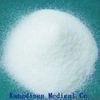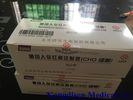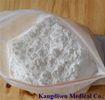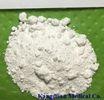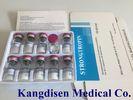9002-61-3 HCG Injection 5000 IU Muscle Growth Hormone For Bodybuilding - 5000 IU/vial
9002-61-3 HCG Injection 5000 IU Muscle Growth Hormone For Bodybuilding For Sale, Most Competitive Price, Fast Delivery, Custom Service, Wholesale 9002-61-3 HCG Injection 5000 IU Muscle Growth Hormone For Bodybuilding, Made in China, High Quality Products!, China cheap prodocuts, china suppliers Supplier, Manufacturer.
9002-61-3 HCG Injection 5000 IU Muscle Growth Hormone For Bodybuilding
?
?
We can supply HCG 5000 IIU with the ?best quality and price.
?
5000 IU/vial with water inside, 10 vials/kit
?
Human chorionic gonadotropin (American English) or Human chorionic gonadotrophin (hCG) is a glycoprotein hormone produced in pregnancy that is made by the developing embryo soon after conception and later by the syncytiotrophoblast (part of the placenta).
?
Its role is to prevent the disintegration of the corpus luteum of the ovary and thereby maintain progesterone production that is critical for a pregnancy in humans. hCG may have additional functions; for instance, it is thought that hCG affects the immune tolerance of the pregnancy. Early pregnancy testing, in general, is based on the detection or measurement of hCG. Because hCG is produced also by some kinds of tumor, hCG is an important tumor marker, but it is not known whether this production is a contributing cause or an effect of tumorigenesis.
?
?
Function
Human chorionic gonadotropin interacts with the LHCG receptor and promotes the maintenance of the corpus luteum during the beginning of pregnancy, causing it to secrete the hormone progesterone. Progesterone enriches the uterus with a thick lining of blood vessels and capillaries so that it can sustain the growing fetus. Due to its highly-negative charge, hCG may repel the immune cells of the mother, protecting the fetus during the first trimester. It has also been hypothesized that hCG may be a placental link for the development of local maternal immunotolerance. For example, hCG-treated endometrial cells induce an increase in T cell apoptosis (dissolution of T-cells).
?
These results suggest that hCG may be a link in the development of peritrophoblastic immune tolerance, and may facilitate the trophoblast invasion, which is known to expedite fetal development in the endometrium. It has also been suggested that hCG levels are linked to the severity of morning sickness in pregnant women.
Because of its similarity to LH, hCG can also be used clinically to induce ovulation in the ovaries as well as testosterone production in the testes. As the most abundant biological source is women who are presently pregnant, some organizations collect urine from pregnant women to extract hCG for use in fertility treatment.
Human chorionic gonadotropin also plays a role in cellular differentiation/proliferation and may activate apoptosis.
?
?
Uses
Tumor marker
Main article: tumor marker
The β subunit of human chorionic gonadotropin is secreted also by some cancers including choriocarcinoma, germ cell tumors, hydatidiform mole formation, teratoma with elements of choriocarcinoma (this is rare), and islet cell tumor. For this reason a positive result in males can be a test for testicular cancer. The normal range for men is between 0-5 IU/ml.
?
?
Fertility
Human chorionic gonadotropin is extensively used as a parenteral fertility medication in lieu of luteinizing hormone. In the presence of one or more mature ovarian follicles, ovulation can be triggered by the administration of hCG. As ovulation will happen about 36–48 hours after the injection of hCG, procedures can be scheduled to take advantage of this time sequence. Thus, patients that undergo IVF, in general, receive hCG to trigger the ovulation process, but have their eggs retrieved at about 36 hours after injection, a few hours before the eggs actually would be released from the ovary.
As hCG supports the corpus luteum, administration of hCG is used in certain circumstances to enhance the production of progesterone.
In the male, hCG injections are used to stimulate the leydig cells to synthesize testosterone. The intratesticular testosterone is necessary for spermatogenesis from the sertoli cells. Typical uses for hCG in men include hypogonadism and fertility treatment.
During first few months of pregnancy, the transmission of HIV-1 from woman to fetus is extremely rare. It has been suggested that this is due to the high concentration of hCG, and that the beta-subunit of this protein is active against HIV-1.
?
?
Weight loss
A controversial usage of hCG is as an adjunct to the British endocrinologist A.T.W. Simeons& acute; ultra-low-calorie weight-loss diet. Simeons, while studying pregnant women in India on a calorie-deficient diet, and “fat boys” with pituitary problems treated with low-dose hCG, discovered that both lost fat rather than lean (muscle) tissue. He reasoned that hCG must be programming the hypothalamus to do this in the former cases in order to protect the developing fetus by promoting mobilization and consumption of abnormal, excessive adipose deposits.
?
Simeons, practicing at Salvator Mundi International Hospital in Rome, Italy, clinic mainly for celebrities, recommended low-dose daily hCG injections (125 units) in combination with a customized ultra-low-calorie (500 cal/day, high-protein, low-carbohydrate/fat) diet loss of adipose tissue without loss of lean tissue. After Simeons’ mysterious death, the diet started to spread to specialized centers and via popularization by such as the controversial author Kevin Trudeau.
The controversy proceeds from warnings by the Journal of the American Medical Association and the American Journal of Clinical Nutrition that hCG is neither safe, nor effective as a weight-loss aid.
?
?
Anabolic steroid adjunct
In the world of performance enhancing drugs, hCG is increasingly used in combination with various anabolic androgenic steroid (AAS) cycles. As a result, hCG is included in some sports& acute; illegal drug lists.
When AAS are put into a male body, the body& acute;s natural negative-feedback loops cause the body to shut down its own production of testosterone via shutdown of the hypothalamic-pituitary-gonadal axis (HPGA). This causes testicular atrophy, among other things. hCG is commonly used during and after steroid cycles to maintain and restore testicular size as well as normal testosterone production.
High levels of AASs that mimic the body& acute;s natural testosterone trigger, the hypothalamus, to shut down its production of gonadotropin-releasing hormone (GnRH) from the hypothalamus. Without GnRH, the pituitary gland stops releasing luteinizing hormone (LH). LH normally travels from the pituitary via the blood stream to the testes, where it triggers the production and release of testosterone. Without LH, the testes shut down their production of testosterone.
?
In males, hCG helps restore and maintain testosterone production in the testes by mimicking LH and triggering the production and release of testosterone.
If hCG is used for too long and in too high a dose, the resulting rise in natural testosterone will eventually inhibit its own production via negative feedback on the hypothalamus and pituitary.
?
?
Hongkong Kangdisen Medical Co., Limited
Address: ROOM C1D, 6/F, WING HING INDUSTRIAL BUILDING, 14 HING YIP STREET, KWUN TONG, KOWLOON, HONG KONG, HONG KONG, HONG KONG, China, 999077
Tel: 86-159-89869841
Hongkong Kangdisen Medical Co., Limited (KDSMED), is located in Hongkong, focusing on production and distribution of biologicals, peptides, hormone, medicines and health products in China, and technological service in pharmaceutical inducstry. All the managers and engineers are experts in the fields of biochemistry, chemistry, or pharmaceuticals.



